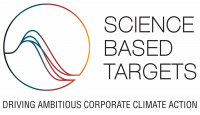Committed to Net Zero: We’ve signed up to Science Based Targets!
22 April 2022

We're pleased to announce we've committed to setting a science-based target, the next step in meaningfully reducing our emissions to help limit global warming.
The latest climate science from the Intergovernmental Panel on Climate Change (IPCC) - described by the UN as “code red for humanity” - shows it is still possible to limit global temperature rise to 1.5°C, but we are dangerously close to that threshold. Rapid and deep emission cuts are therefore crucial to halving global emissions before 2030 and achieving net zero before 2050. Responding to these findings, we set a target to reduce our Scope 1 and 2 carbon emissions by 46% by 2030 compared to our 2019 baseline, and to measure and report our Scope 3 emissions to a similar target.
1. What is a Science Based Target?
A science-based target is an emissions reduction goal defined by climate science with the aim of preventing the worst impacts of climate change. These targets show companies how much and how quickly they need to reduce their greenhouse gas emissions in order to be consistent with keeping warming below the most dangerous levels.
2. What is the Science Based Targets initiative?
The Science Based Targets initiative (SBTi) is a global body enabling businesses to set ambitious emissions reduction targets in line with the latest climate science. It is focused on accelerating companies across the world to halve emissions before 2030 and achieve net-zero emissions before 2050.
The initiative is a collaboration between CDP, the United Nations Global Compact, World Resources Institute (WRI) and the World Wide Fund for Nature (WWF) and one of the We Mean Business Coalition commitments. The SBTi defines and promotes best practice in science-based target setting, offers resources and guidance to reduce barriers to adoption, and independently assesses and approves companies’ targets.
3. Why have we signed up?
We are determined to commit to a wider decarbonisation of our business operations, in addition to our buildings.
To extend our net zero carbon commitments, we aim to continue verifying our offices as net zero carbon in line with the UKGBC’s Framework and making commitments to the UN’s Race to Zero campaign as well as science-based targets. This means extending our carbon accounting beyond the energy consumption of our buildings (“Scope 1 & 2”) to include our “Scope 3” emissions and meeting reduction targets associated with these schemes.

4. What are our targets, and what have we committed to?
We set a target to reduce the business’s Scope 1 and 2 carbon emissions by 46% by 2030 compared to its 2019 baseline. The target aligns with the global decarbonisation needed to limit global warming to 1.5oC above pre-industrial levels.
Moreover, we agreed to measure our Scope 3 emissions (business travel, commuting travel, waste, and water), which we will monitor and report annually and making similar reductions.
Our 2019 emissions were:
- Scope 1: Direct emission from owned or controlled sources = 14.25 tCO2e
- Scope 2: Indirect emissions from the generation of purchased electricity, steam, heating and cooling consumed by the reporting company = 53.88 tCO2e
- Total Scope 1 & 2 for 2019 = 68.13 tCO2e
Our target was approved using a streamlined target validation route exclusive to small and medium-sized enterprises (SMEs).
5. How are we going to achieve these targets?
We have started work on how we will achieve our emissions reduction target and how we can make the changes we need as quickly as possible. The sooner we act, the better for the planet!
A key part of our evolving decarbonisation plan is to install a new air source heat pump at our London office and stop burning gas to heat this Victorian Grade II listed former piano factory. Electrifying our heat supply will also help us to maintain our offices' net zero carbon verification with the UKGBC over the coming years.
As part of a detailed feasibility study, a review into the feasibility of any heat loss measures such as additional insulation to reduce the heat demand before making the change to heat pump will be assessed. Other energy saving measures could also be required such as lighting upgrades for London and Cambridge and IT upgrades.
During 2020-21 our travel emissions were reduced by 82% due to lockdowns and the requirement to work from home. As a result of our continued well-established remote working procedures, our travel emissions have stayed low - in 2021-22 they were 63% less overall than our pre-pandemic baseline, and 70% less per person. Remote meetings are now the default in our new fee bidding template, and we have a ‘no fly’ Business Travel Policy within mainland UK.
"We are committed to reducing our GHG emissions by setting and working towards our targets to reduce our Scope 1, 2 and 3 emissions, not only to practice what we preach in terms of sustainability within the industry, but to increase our understanding of the process to help others that we work with to do the same. Together we can take urgent action to tackle global warming." - Janet Direen, Chair of the Environmental Management Group at Max Fordham

.jpg)